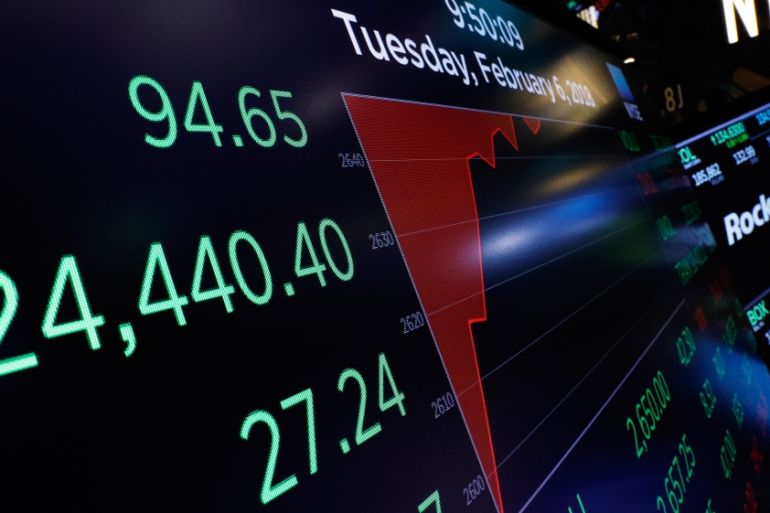Dow Jones recovers after two days of downturn
US stock market stabilises after days of decline led to turmoil in financial indices across the world on Tuesday.

US stock markets appear to be stabilising following a major downturn which has triggered turmoil in financial indices around the world.
Dow Jones Industrial Average opened 500 points down on Tuesday, a fall of almost two percent from levels at closure on Monday, before recovering to a position of slight gains by noon local time (17:00 GMT).
Keep reading
list of 4 itemsShip that caused deadly Baltimore Key bridge collapse towed to port
‘Why should we vote?’ India’s jute workers blame politicians for woes
California farmworkers cheer new housing in town scarred by mass shooting
The volatility follows an initial drop on Friday and a 4.6 percent plummet on Monday, the market’s largest decline, in percentage terms, since August 2011.
The downturn sparked sell-offs in Asian and European markets on Tuesday.
Japan’s Nikkei 225 closed 4.7 percent down, Hong Kong’s Hang Seng index slumped 5.1 percent and the UK’s FTSE 100 dropped more than 2.6 percent by the time trading ended in London at 16:30 GMT.
The FTSE’s drop marks its biggest one-day fall since the day after Britain voted to leave the European Union in a referendum held on June 23, 2016.
David Madden, a market analyst for CMC markets, told Al Jazeera the volatility was a sign of the US economy having outperformed expectations, meaning inflation had been priced too low.
“Usually a sharp market correction is associated with turbulent economic times, but what’s happening here is that the economy is doing better than expected and now the message is that monetary policy and interest rates need to normalise,” he said.
Fellow analyst Marc Ostwald, of ADM Investor Services International, told Al Jazeera the recent market activity was a sign of reality returning to financial indices after notable gains throughout 2017.
“We were on an endless escalator upwards in terms of stock market direction and what we’re seeing now is a massive reality check,” he said.
Al Jazeera’s Gabriel Elizondo, reporting from New York, said that economists also believed that the volatility might have been initially driven by concerns related to inflation.
“The US added 200,000 new jobs in January, which beat expectations, and wages rose about three percent,” he said.
“That’s all very good in the real economy … but on Wall Street, that [raised] potential inflationary concerns, and the US Federal Reserve [is considering] raising interest rates, perhaps.”
The Federal Reserve is expected to raise interest rates at least three times this year.